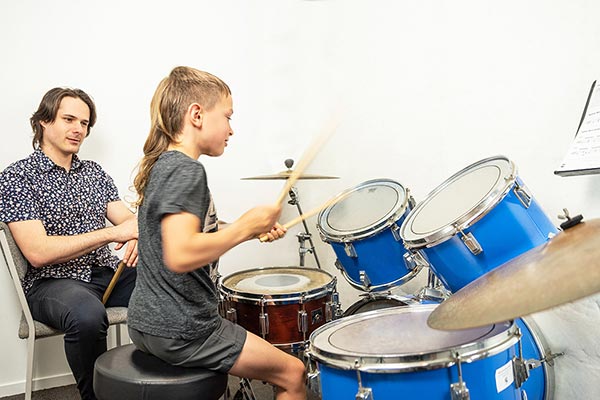In India, music is woven into the fabric of everyday life. It’s a language that transcends words, a force that connects people, and a tool for self-expression. While classical ragas and Bollywood melodies hold a special place in our hearts, there’s a growing trend among parents to introduce their children to the exciting world of drumming.
Drumming offers a unique and engaging way for kids to explore music, develop essential skills, and unleash their creativity. In this blog post, we’ll delve into the benefits of drumming for children and provide a guide to choosing the right beginner drum classes or online drum lessons for your little rockstars.
Why Drumming for Kids?
- Motor Skills and Coordination: Drumming requires coordination between hands and feet, improving fine and gross motor skills. Children learn to control their limbs independently, enhancing their overall dexterity and physical coordination.
- Cognitive Development: Playing drums engages both hemispheres of the brain, promoting cognitive development and improving memory, attention span, and problem-solving abilities. Studies have shown that children who learn music often excel in academic subjects like math and language.
- Emotional Expression and Stress Relief: Drumming provides a healthy outlet for children to express their emotions, release pent-up energy, and reduce stress. The rhythmic patterns and physical exertion can be therapeutic, promoting relaxation and emotional well-being.
- Creativity and Self-Confidence: Drumming allows children to explore their creativity and express themselves through rhythm and sound. As they learn to create their own beats and patterns, their confidence grows, and they develop a sense of pride and accomplishment.
- Social Skills and Teamwork: Drumming can be a social activity, especially in group classes or bands. Children learn to collaborate, listen to each other, and work together to create a unified sound. This fosters teamwork, communication, and leadership skills.
Choosing the Right Drumming Lessons for Your Child:

- Age-Appropriate Classes: Look for beginners drums classes that cater to your child’s age and skill level. Younger children may benefit from introductory classes that focus on basic rhythm and movement, while older children can progress to more advanced techniques and styles.
- Online vs. Offline Lessons: Consider your child’s learning style and preferences. Online drum lessons offer convenience and flexibility, while offline classes provide a more structured and social learning environment. Some platforms even offer beginners online drum classes with live instruction and interactive features.
- Qualified Instructors: Choose teachers who are experienced in working with children and have a passion for teaching drums. Look for certifications and testimonials to ensure the instructor’s credentials.
- Fun and Engaging Curriculum: The best beginners drums lessons focus on making learning fun and engaging. Look for classes that incorporate games, interactive activities, and popular music to keep children excited about drumming.
- Performance Opportunities: Enquire about performance opportunities like recitals or concerts. Performing in front of an audience can boost your child’s confidence and provide a sense of accomplishment.
Drumming is more than just a fun activity for children; it’s a powerful tool for their overall development. By enrolling your child in beginner drum classes or online lessons, you’re giving them the gift of music, creativity, and a lifelong skill that can enrich their lives in countless ways. So, let the beat drop and watch your child’s confidence and musical talent soar!







